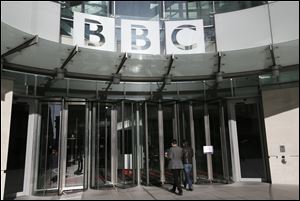
TELEVISION
‘The Hour’ returns for Season 2
11/27/2012
A general view of the BBC headquarters in London.
After one of the most listless fall TV seasons in recent memory, the British are coming to perk things up with the second year of the best series on TV whenever Homeland, Breaking Bad, or Mad Men isn’t airing.
Returning Wednesday on BBC America, The Hour somehow manages to be even better than it was last year.
How good is it? Much as I love Downton Abbey, The Hour is even more engaging, thanks in large part to Abi Morgan, creator and writer of the series about a group of BBC TV journalists in the ’50s, trying to balance personal lives with a frenzied commitment to covering the news of the day no matter who gets knocked around by the details.
Like Vegas and Mad Men, The Hour is a period piece exploring themes that resonate with a modern-day audience. Last year focused on the moment in British broadcast history when the BBC wriggled out from under the censoring thumb of the British government through the creation of a news magazine show called The Hour.
Bel Rowley (Romola Garai) was put in charge of the new show, working closely with her friend and colleague, Freddie Lyon (Ben Whishaw), a zealously crusading journalist. Freddie’s passion regularly gets him into hot water with higher-ups, which is one reason why he was passed over as the anchor of the new show in favor of the shallow, heavy-drinking Hector Madden (Dominic West).
The first season found the BBC tangled up in a spy caper surrounding the Suez Crisis. It worked well enough as a kind of framing device for the personal lives of the BBC staff, including veteran, seen-it-all reporter Lix Storm (Anna Chancellor), who heads up the foreign desk.
This year, Morgan has moved toward an even more effective background story, that of the Cold War. The network has a new head of news in Randall Brown (Peter Capaldi) — eccentric, unflappably cool, and determined to breathe new life into the BBC’s magazine show.
At the start of the new season, Bel is intensifying her focus on her job after her fling with Hector last year, and Hector is trying to escape his stale marriage to Marnie (Oona Chaplin) with alcohol and other women.
Even more than Mad Men, The Hour focuses on women defining themselves in the work place and at home, rejecting traditional roles in a period of social change. Lix and Bel are independent women with careers. If they have relationships, it’s by choice, not because they cling to the idea that a woman should meet a man, fall in love, and work toward marriage and children.
Marnie, on the other hand, has tried to follow the unwritten societal rules, to be a stay-at-home wife, ready to greet her husband at the end of his work day with a lovely meal she’s cooked herself. Of course, the fact that Hector is a dog changes the equation, prompting Marnie to set new rules for their marriage and to go out in search of her own life and career.
The men are also fascinating. Hector could be dismissed as a womanizing drunkard, but what makes him so resolutely self-destructive at every turn, endangering not only his marriage, but his career?
Despite his occasionally flirtatious relationship with Bel, Freddie has always seemed consumed by his work. But after being fired last season, his whereabouts are unknown as the new season starts. If he returns, will it change his relationship with Bel, at work and otherwise?
The complexity of Morgan’s characters is only further enhanced by the news events they are covering. The Cold War isn’t just about the United Kingdom’s relationship with the Soviet Union — it’s also about Anglo-American relations, and the lack of trust between the two allies mirrors more than one personal relationship in The Hour.